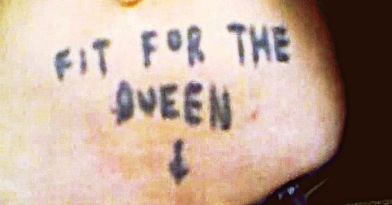A piece of ‘gutter cinema’ made under the ‘Pink8 manifesto’ guidelines, Black Biscuit is quite the viewing-experience. After watching it, you’ll more than likely feel like you need a good shower. And it’s difficult to determine the value of such a film – because though it certainly has an emotional effect, there’s a definite question to be asked as to how meaningful the content really is. In all honesty, it seemed to me vacuous. But perhaps I am among the uninitiated with regards this particular genre and style.
There is no strict narrative (well, there is a protagonist played by the director, who wanders round meeting up with people, trying to earn money via prostitution, & c). It almost falls into the category of essay film or tone poem but in the end it’s hard to discern what it is. If it’s an essay film, what’s its thesis? If it’s a tone poem, what’s its intent?
I can deal with the aesthetic and I can deal with the lack of narrative. These aspects are perfectly permissible (and have been effectively handled by the likes of Harmony Korine, Lars von Trier, Richard Linklater & c). But what I couldn’t get over whilst I was watching the film is there is simply no apparent purpose behind anything that appears on screen.
It’s opening credits announce that Black Biscuit was “Written, directed and produced by Fabrizio Federico”, but I’m not really sure what kind of writing or directing he did. The few moments that might be scripted are underdeveloped sketches at best, poorly performed – the rest appears improvised and is only of occasional interest.
 One through-line is a series of references to the death of Michael Jackson, which appears to have been a recent event at the time of filming. Again, what relevance this has to anything else in the film is unclear.
One through-line is a series of references to the death of Michael Jackson, which appears to have been a recent event at the time of filming. Again, what relevance this has to anything else in the film is unclear.
In its defence, the film is at its most compelling with the snippets of raw candid-camera footage. There are moments of poetry of all forms, visual, aural, linguistic, both natural and humanist. There are shots of light shining through a spider’s web, a child on a luggage conveyer belt, snow flurrying towards the camera in the dead of night – here it almost feels like a no-budget Terence Malick. There are scenes of rare domesticity and captured beauty, scenes of ugliness and punk grime. However, these moments are unfortunately short-lived.
The rest of the film is a montage of random events that are occasionally staged. There are funny moments, even moving moments, but all that amid a lot of meaningless filth. Perhaps this is exactly what Federico intended for the movie. I’m not so sure; if I’m honest, it’s hard to believe that the director “intended” anything at all; it mostly feels like aimless provocation with little or no thought and absolutely no formal film-making talent on show (indeed, the first rule on the Pink8 Manifesto is “film school is poison”). And none of this justifies its running time which is in excess of 2 hours.

Black Biscuit did remind me at points of Gummo and Slacker, but it hasn’t the art and poetry of either film. This is what the director doesn’t seem to understand. It is of course possible to change the language of cinema – there were movements throughout the 20thcentury that did exactly this – but you can’t just shoot a bunch of stuff at random and posit superiority to a tradition of film-making or expect people to find meaning in it.
It is my opinion that the cinematic form has evolved by bettering itself, via experimentation and innovation. And that doesn’t mean it has become more suffocating; film-makers are subversive all the time. It’s so easy for a director to hide behind the kind of aesthetic that Black Biscuit displays – sloppiness can be justified as innovation or subversion, but if there’s no artistic intent behind it, how much worth is there? Having no budget doesn’t mean you have to resort to the kind of nihilistic approach that Black Biscuit wears like a medal – just look at Clerks, a classic piece of cinema made on no budget. In short, there’s a difference between interrogating cinematic language (as Godard did) and simply speaking gibberish (et voilà).
A bad review from some snobby critic is probably exactly what the film-maker expects, maybe even wants. Indeed, this is true punk cinema, a fuck you to the establishment. This review could well be marked as a small victory.
Well, here you go. You’re welcome Mr Federico.
On the whole, your film did not impress me.





